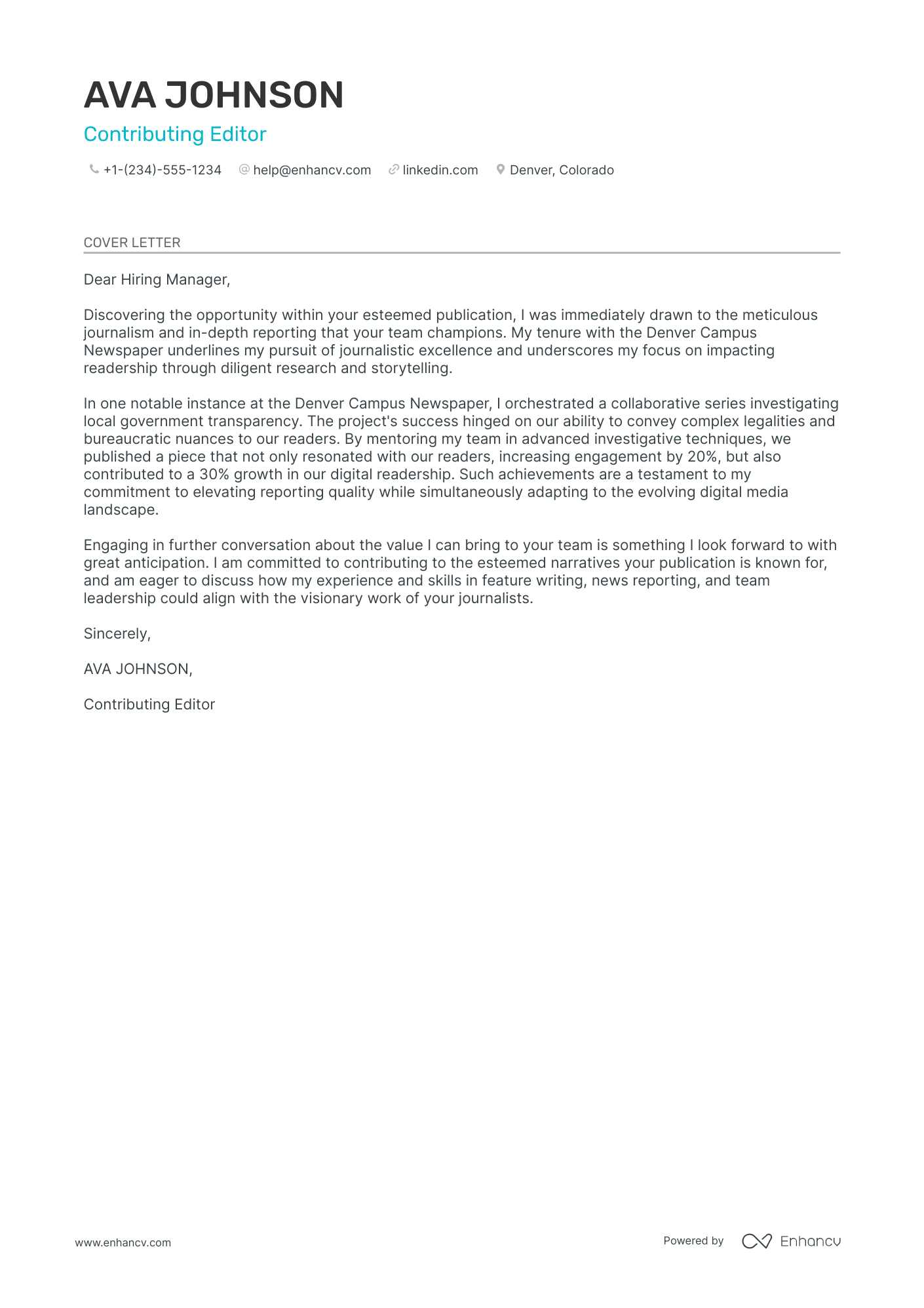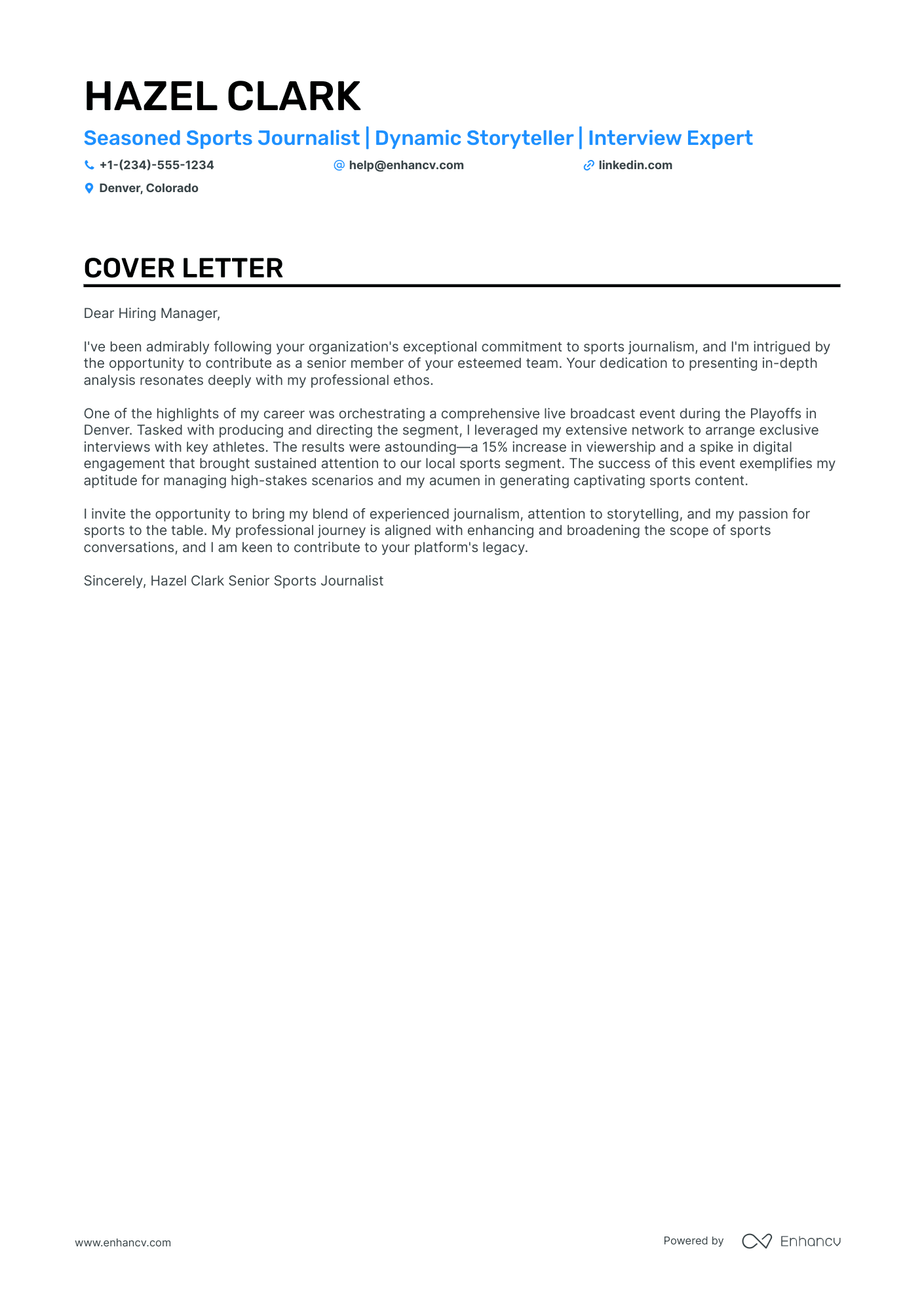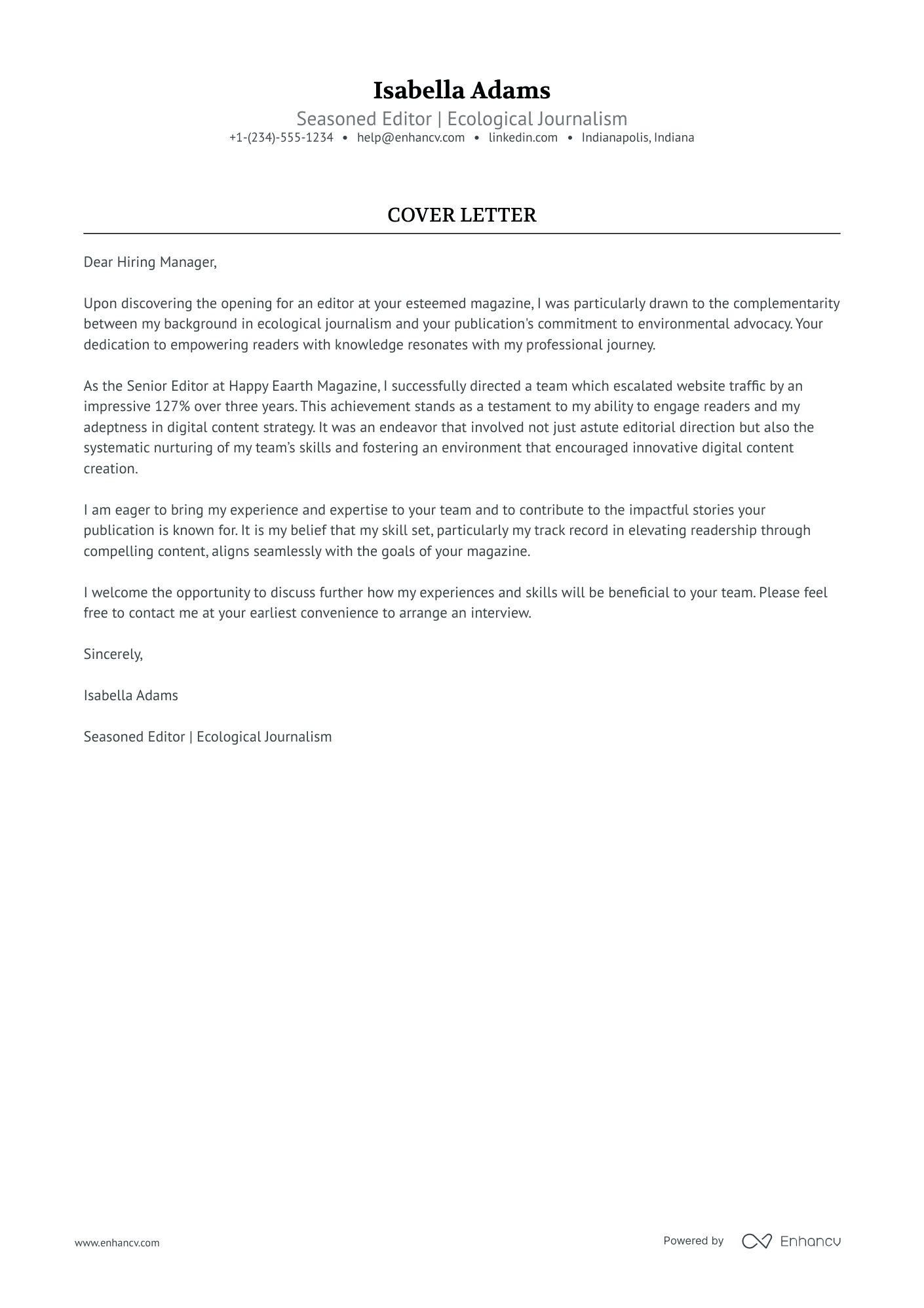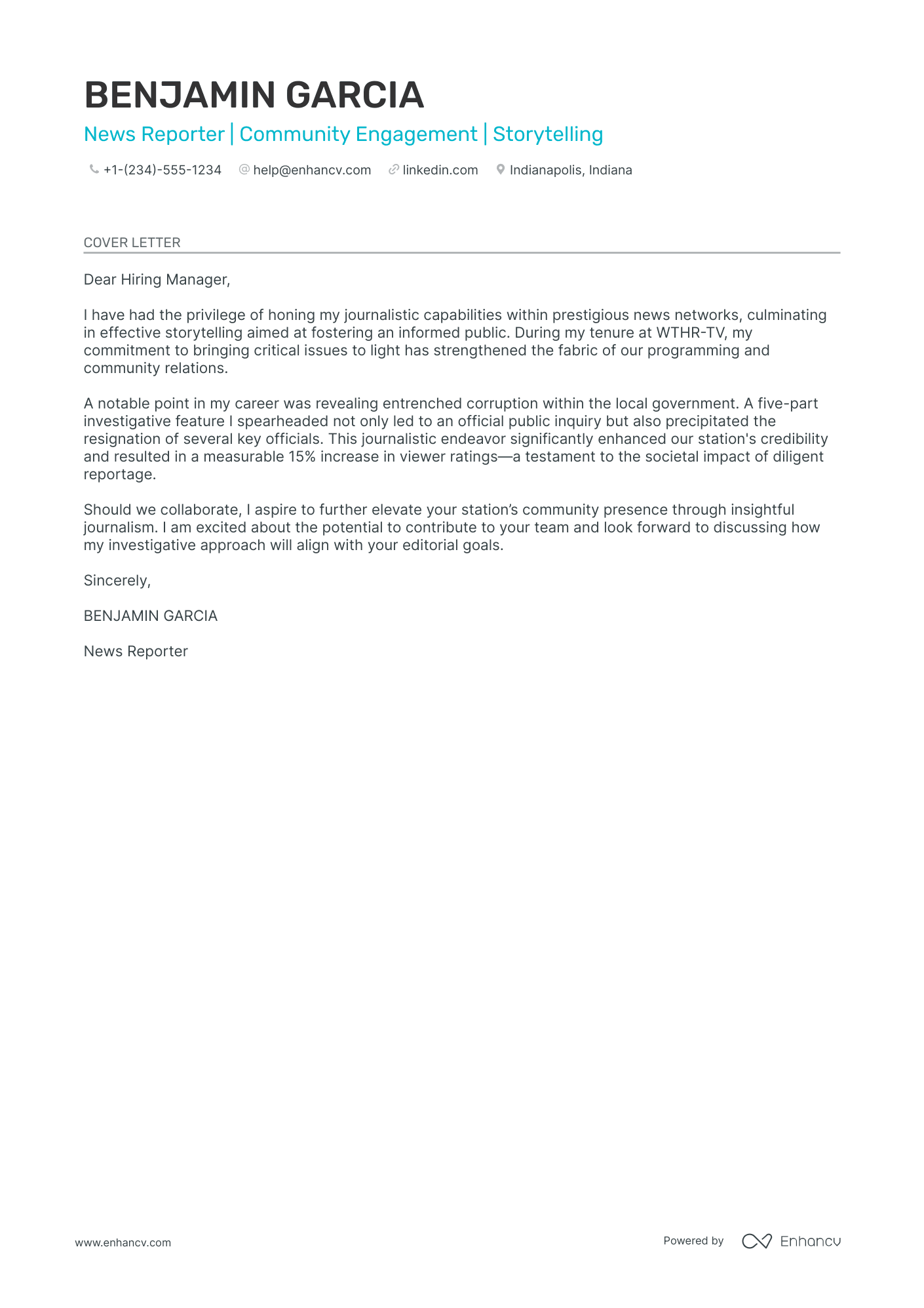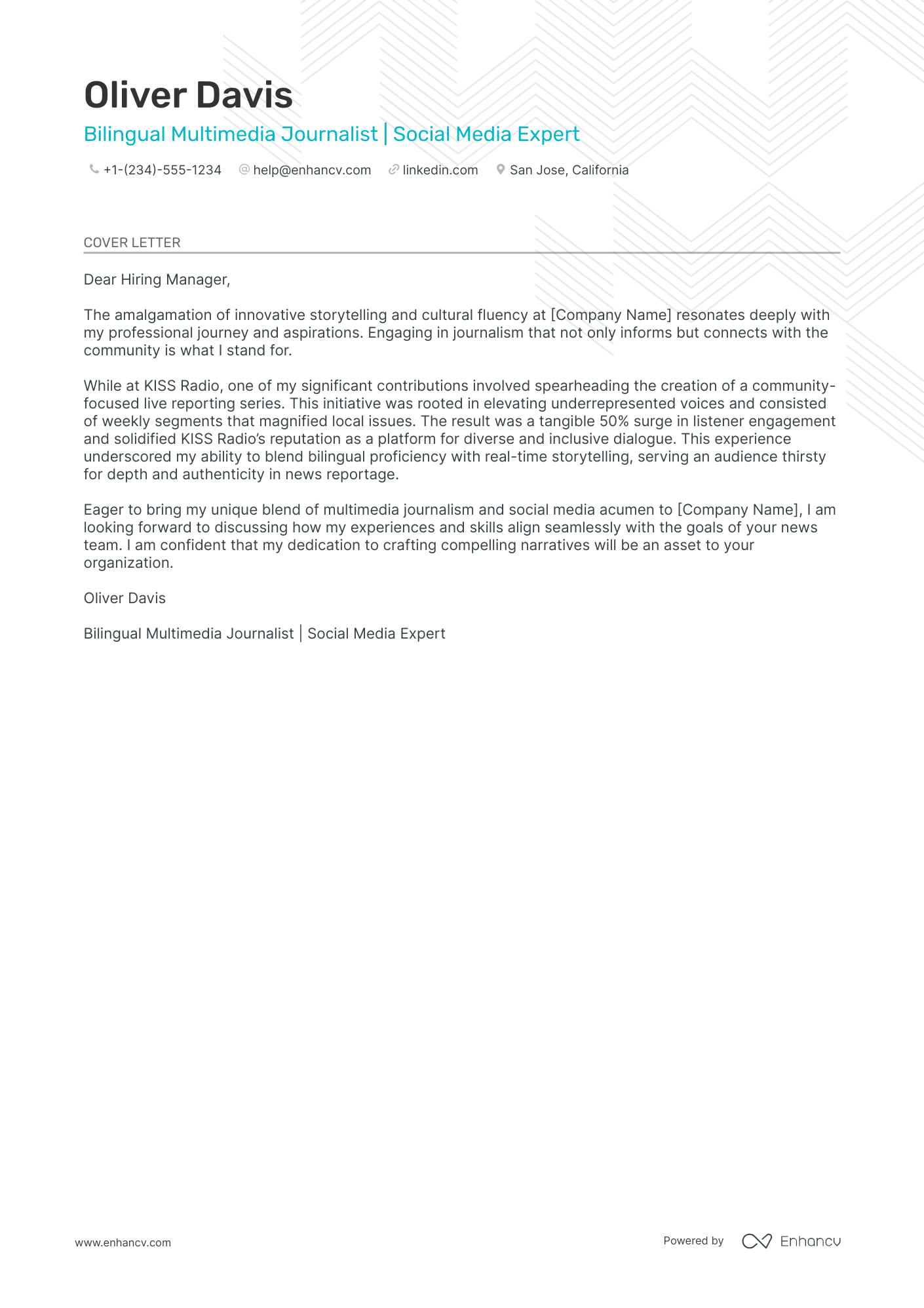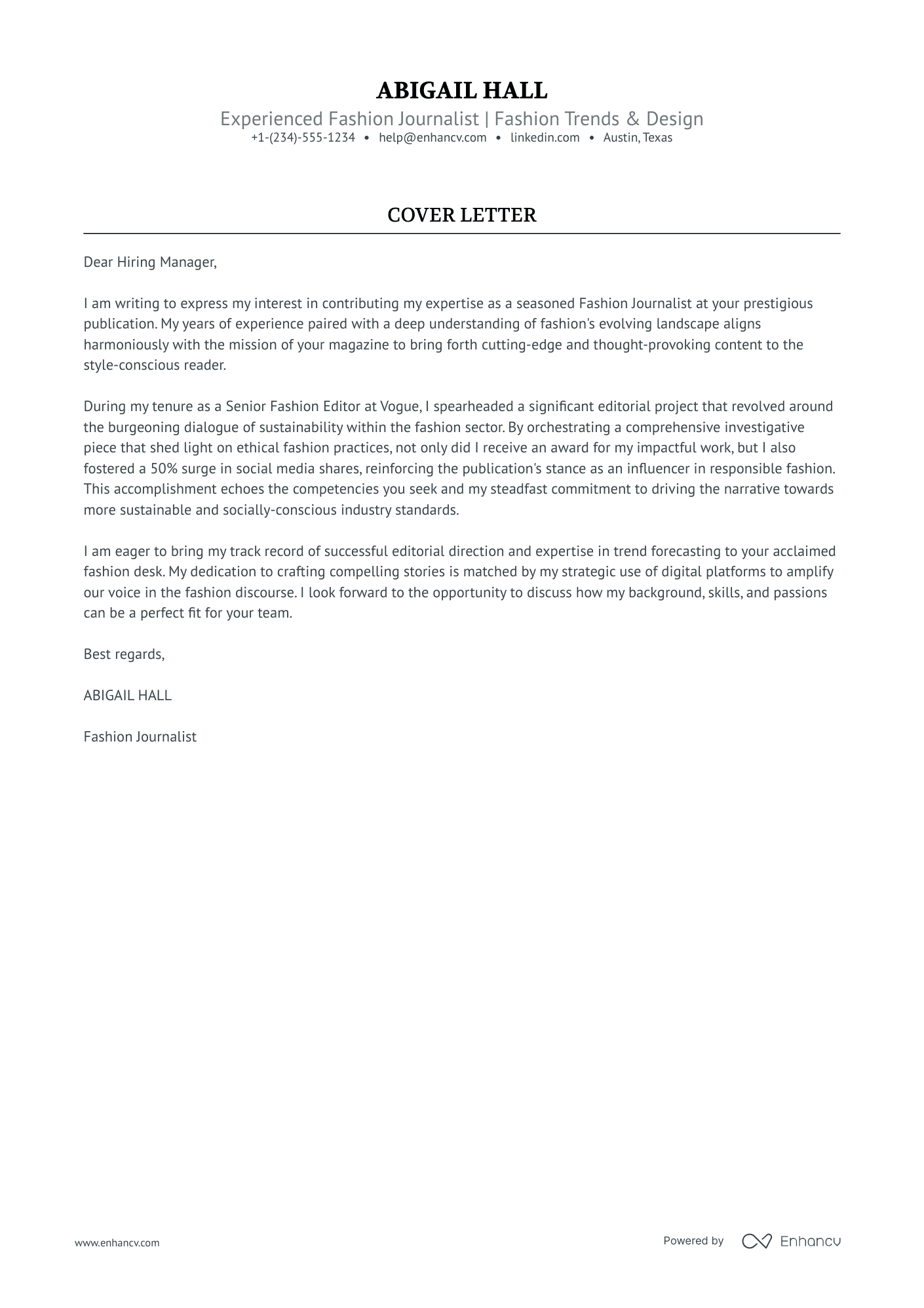Crafting a journalist cover letter can be a daunting step in the job application process. You've meticulously updated your resume and now realize a cover letter is required—one that doesn't just mimic your resume, but spotlights your proudest journalistic triumph through an engaging narrative. Striking a balance between formality and originality, avoiding clichés, and condensing your story into a single page adds to the challenge. Let's navigate these hurdles together and pen a cover letter that stands out.
- Create a journalist cover letter to persuade the recruiters you're the best candidate for the role;
- Use industry-leading journalist cover letter templates and examples to save time;
- Dedicate your journalist cover letter space to your best achievement;
- Make sure your journalist cover letter meets recruiters' expectations and standards.
Avoid starting at the blank page for hours by using Enhancv's AI - just upload your resume and your journalist cover letter will be ready for you to (tweak and) submit for your dream job.
If the journalist isn't exactly the one you're looking for we have a plethora of cover letter examples for jobs like this one:
Drop your resume here or choose a file.
PDF & DOCX only. Max 2MB file size.
Journalist cover letter example
John Doe
San Francisco, CA
+1-(234)-555-1234
help@enhancv.com
- Highlighting relevant experience such as the exclusive scoop on AI in autonomous vehicles showcases the candidate's ability to deliver impactful and newsworthy content, which is crucial for a journalist role.
- Emphasizing the results of the candidate's work, including the 30% increase in website traffic, demonstrates data-driven accomplishments and an understanding of audience engagement, both important for a digital publication.
- Expressing enthusiasm and alignment with the publication's standards and goals suggests a cultural fit and an appreciation of the company's values, making the candidate potentially more appealing to the hiring manager.
Structuring and formatting your journalist cover letter
Here's what the structure of your journalist cover letter should include:
- Header (with your name, the position you're applying for, and the date);
- Salutation (or greeting);
- Introductory paragraph (or your opening statement);
- Body paragraph (or further proof of your experience);
- Closing paragraph (with a call to action);
- Signature (that is optional).
Use the same font for your journalist resume and cover letter - modern fonts like Lato and Rubik would help you stand out.
Your journalist cover letter should be single-spaced and have a one-inch margins - this format is automatically set up in our cover letter templates and our cover letter builder.
When submitting your cover letter, always ensure it's in PDF, as this format keeps the information intact (and the quality of your document stays the same).
On one final note - the Applicant Tracker System (ATS or the software that is sometimes used to initially assess your application) won't read your journalist cover letter.
Pressed for time? Use our free cover letter generator to turn your resume into a cover letter effortlessly.
The top sections on a journalist cover letter
- Header: Include your contact information at the top of the cover letter so the recruiter can easily reach you; for journalists, having a professional header signals attention to presentation and detail, which are relevant to the role.
- Personalized Greeting: Research and use the name of the hiring manager or editor; personalization shows you've done your homework, an essential trait for a journalist.
- Introduction: Begin with a compelling hook and showcase your passion for journalism; this sets the tone and demonstrates your storytelling ability.
- Career Highlights: Detail relevant reporting experiences, key stories covered, or significant achievements in journalism; this section shows your practical expertise and credibility in the field.
- Closing Paragraph: Conclude with a strong finish, reiterating your enthusiasm for the position and explaining how you plan to contribute to their team; as a journalist, your concluding remarks should leave a lasting impression, prompting the recruiter to take action.
Key qualities recruiters search for in a candidate’s cover letter
- Strong writing and storytelling skills: Demonstrates the ability to create compelling content that engages readers.
- Nose for news: Shows an instinct for digging up newsworthy stories that are relevant and interesting to the audience.
- Investigative research abilities: Reflects the capacity to conduct thorough and accurate research, crucial for credibility and in-depth reporting.
- Multimedia proficiency: Indicates the capability to use various platforms and tools, like video, audio, and social media, for modern, multi-channel journalism.
- Ethical integrity: Recruiters look for journalists who adhere to high ethical standards, maintaining trustworthiness and impartiality.
- Resilience under pressure: Illustrates the potential to perform efficiently against tight deadlines and in potentially stressful or dangerous situations.
Kick off your journalist cover letter: the salutation or greeting
When writing your journalist cover letter, remember that you're not writing for some complex AI or robot, but for actual human beings.
And recruiters, while on the lookout to understand your experience, would enjoy seeing a cover letter that is tailored to the role and addresses them. Personally.
So, if you haven't done so, invest some time in finding out who's the hiring manager for the role you're applying to. A good place to start would be LinkedIn and the corporate website.
Alternatively, you could also get in touch with the company to find out more information about the role and the name of the recruiter.
If you haven't met the hiring manager, yet, your journalist cover letter salutation should be on a last-name basis (e.g. "Dear Mr. Donaldson" or "Dear Ms. Estephan").
A good old, "Dear HR Professional" (or something along those lines) could work as your last resort if you're struggling to find out the recruiter's name.
List of salutations you can use
- Dear [Hiring Manager's Name],
- Dear [Editor-in-Chief's Name],
- Dear [Mr./Ms./Dr. Last Name],
- Dear [Publication Name] Team,
- Dear [Department Name] Search Committee,
- Dear [Hiring Manager's Title],
Your journalist cover letter intro: showing your interest in the role
On to the actual content of your journalist cover letter and the introductory paragraph.
The intro should be no more than two sentences long and presents you in the best light possible.
Use your journalist cover letter introduction to prove exactly what interests you in the role or organization. Is it the:
- Company culture;
- Growth opportunities;
- Projects and awards the team worked on/won in the past year;
- Specific technologies the department uses.
When writing your journalist cover letter intro, be precise and sound enthusiastic about the role.
Your introduction should hint to recruiters that you're excited about the opportunity and that you possess an array of soft skills, e.g. motivation, determination, work ethic, etc.
Storytelling in the middle (or body) of your journalist cover letter
You've got your whole resume sorted, detailing your achievements and skills. What else can you write in your journalist cover letter?
For starters, take the time to re-assess the job requirements and re-discover the most crucial skills and requirements (or keywords).
After making a list of these important keywords, look back on your experience to select just one of your past accomplishments.
Choose the achievement that is the most noteworthy, relevant to the role, and matches the required skills.
Use the next between three and six paragraphs to narrate how:
- you've grown your skill set, thanks to your achievement;
- you'd use the know-how you've gained in your new role;
- your accomplishment could help your potential employers grow.
Remember that recruiters don't need a retelling of your whole resume, but want to find out what makes you, you.
Final words: writing your journalist cover letter closing paragraph
The final paragraph of your journalist cover letter allows you that one final chance to make a great first impression.
Instead of going straight to the "sincerely yours" ending, you can back up your skills with a promise of:
- how you see yourself growing into the role;
- the unique skills you'd bring to the organization.
Whatever you choose, always be specific (and remember to uphold your promise, once you land the role).
If this option doesn't seem that appealing to you, close off your journalist cover letter with a follow-up request.
You could even provide your availability for interviews so that the recruiters would be able to easily arrange your first meeting.
Which story should you tell in your journalist cover letter when you have zero experience
Candidates, lacking professional experience in the field - this one is for you.
Your journalist cover letter is an exercise of integrity, honesty, and, above all, spinning a positive narrative around your strengths.
And what better way to capture recruiters' attention than with your most job-relevant achievement (this could be from your internship or volunteering experience)?
Make sure to back up your success with transferrable skills that are relevant to the job (e.g. how your year, studying abroad, has taught you to be more motivated and handle multicultural environments).
Another safe card you can bet on is your career dream: in the body of your journalist cover letter, go into the details of how your ambitions would help make the company you're applying for better.
Key takeaways
Within this Enhancv guide, we've provided you with plenty of advice and inspiration on writing your journalist cover letter:
- Always make sure your journalist cover letter is tailored to the role you're applying for to make a good impression on recruiters;
- In your journalist cover letter include a header (with your name, the role you're applying for, date, and contact details) and an introduction of up to two sentences that highlight your key accomplishment or why you'd fit the role;
- Focus your journalist cover letter body on one sole achievement through your career and all the valuable lessons, skills, and know-how you've learned (that are relevant to the role);
- Ensure your journalist cover letter closing statement isn't generic and includes either a call to action or a promise;
- If you lack professional experience, shift recruiters' focus to a relevant achievement (thanks to your academic or versatile experience) or toward your dreams and goals for professional growth.
Journalist cover letter examples
By Experience
Student Journalist
By Role
